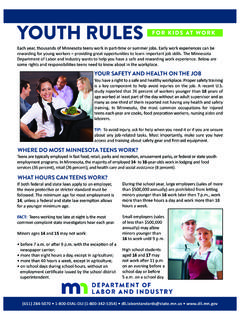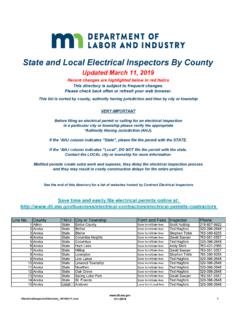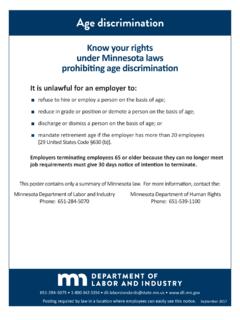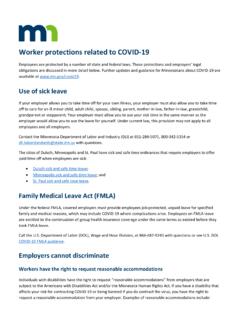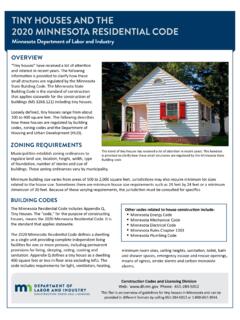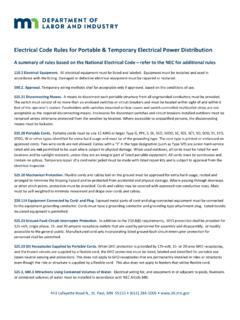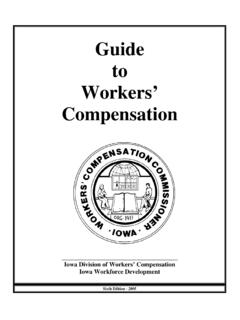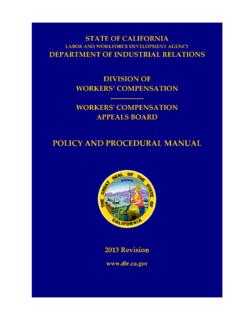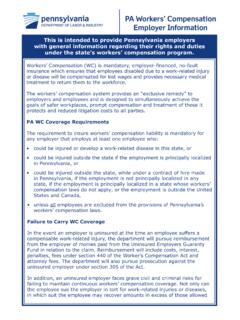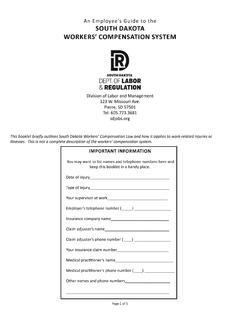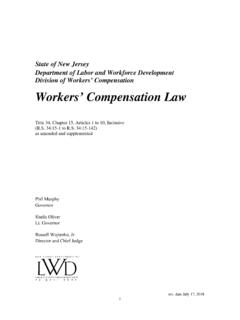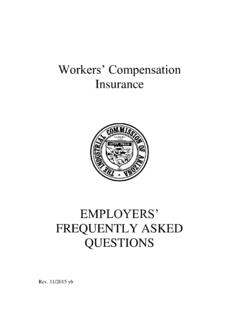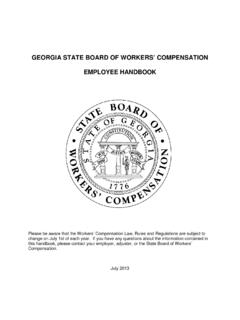Transcription of FAQs: Workers’ compensation coverage for employees who ...
1 443 Lafayette Road N., St. Paul, MN 55155 651-284-5005 Updated: Feb. 16, 2022 FAQs: Workers compensation coverage for employees who contract COVID-19 1. What does the presumption law do? The presumption law provides that employees on the front lines of the COVID-19 pandemic, as described in Question 2, are presumed to have contracted a workers compensation occupational disease if they become ill with COVID-19. A summary of the law, including a link to the law, is at 2. Who is covered by the presumption law? An employee is entitled to the presumption if they contract COVID-19 on or after April 8, 2020, while employed in one of these occupations: a licensed peace officer under Minnesota Statutes, section , subdivision 1, a firefighter, a paramedic or an emergency medical technician; a nurse or health care worker , correctional officer or security counselor employed by the state or a political subdivision (such as a city or county) at a corrections, detention or secure treatment facility; a health care provider, nurse or assistive employee employed in a health care, home care or long-term care setting, with direct COVID-19 patient care or ancillary work in COVID-19 patient units; and a person required to provide child care to first responders and health care workers under Executive Orders 20-02 and 20-19.
2 The Minnesota Department of Education has more information about at: o ; and o An employee s date of injury is either the date the employee was unable to work due to contraction of COVID-19 or was unable to work due to symptoms that were later diagnosed as COVID-19, whichever occurred first. 3. Is there a definition of assistive employee or ancillary work ? The presumption law does not define assistive employee or ancillary work, although a reasonable argument can be made that the terms include professional and nonprofessional employees who performed a variety of work in a health care setting, in addition to nurses and health care providers. Any employee who works in health care and believes they might have COVID-19 due to their employment should take the steps identified in Question 6. 4. Do employees need to be tested for COVID-19 to qualify for the presumption? No, employees do not need to be tested for COVID-19 to qualify. An employee can qualify by showing either: o a positive laboratory test; or o if a test was not available for the employee, a diagnosis based on symptoms by a licensed physician, licensed physician s assistant or licensed advanced practice registered nurse.
3 A copy of the test results or the diagnosis by one of the listed health care providers must be provided to the employer or insurer. 5. What does it mean to rebut the presumption? If an employee has contracted COVID-19 and is employed in one of the occupations as described in Question 2, the illness is presumed to be a workers compensation occupational disease and is compensable, unless the employer rebuts (disproves) the presumption. The employer may only rebut the presumption by proving the employee s employment was not a direct cause of the disease. The employer has the burden of proving by the preponderance of the evidence, that while performing his or her job duties, the employee was not exposed to COVID-19 or the exposure to COVID-19 could not have been a cause of the employee s illness. 6. What should an employee do if they think they contracted COVID-19 while working? The employee should notify their employer as soon as possible after they develop symptoms they think could be COVID-19.
4 There are time limitations for reporting an injury to the employer. See The employee should keep a record of when they developed symptoms and when they notified their employer of those symptoms. The employee should seek medical care from one of the health care providers identified in Question 4 and request a test for COVID-19. If a test is not available, the employee should request that the health care provider document a test was not available and further document their symptoms and provide a diagnosis of whether they believe the employee has COVID-19. The employee should provide a copy of the test results or the diagnosis to their employer or their employer s insurer. 7. What are an employer s obligations when an employee reports an injury or illness? The employer must file a first report of injury with the workers compensation insurer or claim administrator. The insurer or claim administrator must notify the employee in writing within 14 days whether the employee s claim is accepted or denied.
5 If the employer does not file a report of injury with its insurer or claim administrator, the employee may call the Department of Labor and Industry for help. (See Question 13.) 8. What are an employee s rights if their workers compensation claim is denied? Information about an employee s options if their claim is denied is at 9. Can I still make a workers compensation claim related to COVID-19 if I am not employed in one of the occupations described? Yes, an employee who has COVID-19 but who does not fall into one of the occupations described in Question 2 can still claim a workers compensation injury or occupational disease if they believe their illness is due to their employment. The employee should notify their employer as soon as possible. The employee can also call the Department of Labor and Industry for assistance. (See Question 14.) 10. What benefits are available to employees under workers compensation law? Workers compensation benefits include medical treatment, monetary benefits for wage loss and permanent disability, dependency benefits under Minnesota Statutes, section , and vocational rehabilitation benefits.
6 Information about workers compensation benefits is available at: ; and 11. Are employees entitled to workers compensation benefits if they are exposed to COVID-19 at work and are required by their employer to self-isolate? If an employee is not ill, but must stay home from work because they were exposed to the COVID-19 virus, they are not entitled to workers compensation benefits. If an employee was exposed at work and later contracted COVID-19, the illness may be a workers compensation injury. 12. When does the presumption law expire? The presumption law in Laws 2020, chapter 72, section 1, was amended effective April 27, 2021, in Laws 2021, chapter 12, section 12. The new language provides that the COVID-19 presumption expires at 11:59 , Dec. 31, 2021. The law was revived and reenacted effective Feb. 3, 2022, and will expire at 11:59 , Jan. 13, 2023. employees with dates of injury that occur from Jan. 1 to Feb. 2, 2022, are not entitled to the presumption in section , subdivision 15, paragraph (f), but are not precluded from claiming an occupational disease as provided in other paragraphs of section , subdivision 15, or from claiming a personal injury under section , subdivision 16.
7 (See Question 9.) 13. Is other relief available to workers who contract COVID-19, aside from workers compensation benefits? Yes, an information sheet about other worker protections is available at o This is also available in Hmong, Somali and Spanish at FAQs for employers and employees about COVID-19 are available at 14. Where can I get help with questions about the new law or workers compensation benefit? For assistance, contact the DLI Workers compensation division Help Desk at 651-284-5005 (press 3), 800-342-5354 (press 3) or


